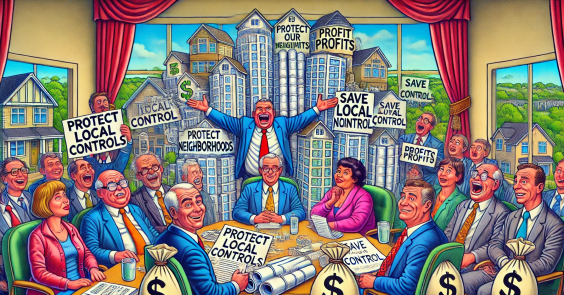
The North Carolina legislature has passed SB382, which contains a sweeping revocation of the local control of all municipal governments to down-zone to lower density. The legislators who supported this say that it is needed to combat local government abuses in western NC post-Helene, but some representatives from those areas actually voted against it.
Another stated justification by Republican legislators is that this is a “conservative” effort to protect property rights. But whose property rights are being protected? The scales are now tipped in favor of those who want to build high-density residential, at the expense of the owners of any surrounding property.
Property Rights
Property rights are not absolute, and they shouldn’t be. One cannot decide to build an oil refinery on one’s property because it would affect the quality of life of the neighbors. Likewise with residential zoning – building at a density that creates pressure for higher taxes also affects the neighbors. This is generally the case with higher density residential because the cost of town and county services to the high-density residents is not covered by the property taxes they pay.
Higher density residential is the most profitable type of project for developers. That’s why there’s always a fight between what developers want and what town/county residents want. NC doesn’t allow impact fees, and this allows developers to rake in much larger profits as the infrastructure and services required to support their projects is largely on the backs of the taxpayers and ratepayers.
In addition to taxes and cost to serve, there are other good reasons to down-zone – for example, if the eastern spur of the Waxhaw Parkway goes ahead, it would make sense to down-zone around it so that it won’t be crammed with driveways that impede traffic flow.
The “property rights” part of this bill is not “conservative”. If anything it’s the opposite – top-down control from Raleigh instead of allowing local governments to tend to their own affairs. That is the opposite of what the Founding Fathers envisioned for this country – local control and community-based decision-making. It’s changes like this that signal to North Carolinians that our state representatives are acting on behalf of builders and developers.
